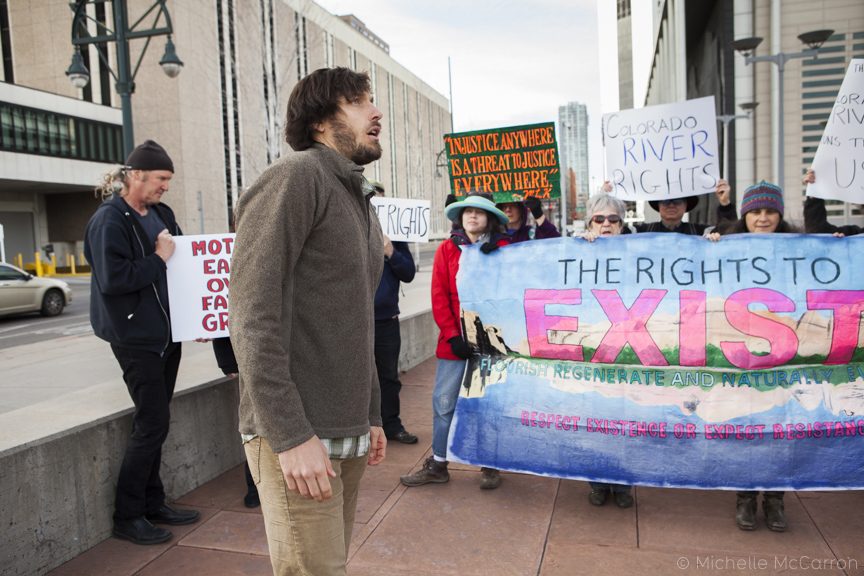Featured image by Michelle McCarron
Editor’s note: This is the latest installment from Will Falk as he follows the Colorado River from headwaters to delta, before heading to court to argue for the Colorado River to be recognized as having inherent rights. More details on the lawsuit are here. The index of dispatches is here.
by Will Falk / Deep Green Resistance Southwest Coalition
Tuesday, I stood on the steps of the Alfred A. Arraj Federal Courthouse in Denver before a crowd gathered to hear my thoughts as one of the “next friends” in our lawsuit seeking personhood for the Colorado River. We were supposed to have a hearing, but the court postponed it at the last minute. With so many of us traveling to Denver from across the Colorado River Basin, we decided to proceed with the press conference anyway.
It wasn’t the anxiety public speaking can induce that produced the tremor in my hand, the acid in my gut, or the quiver in my voice. It was a simple question, unresolved: Is it dishonest to speak of hope when you feel none?
Tuesday also marked the beginning of my fourth week traveling with the Colorado River. For going on four weeks now, I’ve pestered her with two questions. Who are you? And, what do you need?
I began my speech explaining that I arrived there after three weeks with the river. I recounted the violence I witnessed in La Poudre Pass where the Grand Ditch lies in wait to steal the Colorado River’s water moments after the union of snowpack, sunshine, and gravity gives her birth. I reported the energy expended pumping the river’s water uphill from Lake Granby reservoir to Shadow Mountain reservoir and then into Grand Lake before the Alva B. Adams tunnel drags the water 13 miles across the Continental Divide and beneath Rocky Mountain National Park to meet Front Range demands. I described the view from Palisade, CO where peaches are grown in the middle of the desert and criss-crossing canals, seen from the mountains, appear as vast, mechanical tattoos sewn into the flesh of the land.
I paused at this point, knowing that, after presenting my audience with a series of distressing images, I was supposed to leave them with a positive message. While I reflected on what I had seen and said, however, I felt the river’s truth spill over me. For three weeks, I thought I had been listening to the Colorado River. But, she isn’t a river anymore. Not truly. She has been so diverted and dammed, experienced so much extraction and exploitation, that the best way to describe her is not as a river, but as an industrial project, as a series of tunnels, concrete channels, and canals, as another tortured corpse stretched across civilization’s rack.
While this realization washed over me, I considered our lawsuit and the rights of nature. I wondered if it is possible to grant rights to a ghost. I questioned whether the Colorado River could ever recover from what’s been done to her.
Grief threatened to overwhelm me, to silence me in despair. If I had been by myself, caught in the flow of these emotions in private, I would have wept. But, the presence of the crowd steadied me and as the despair trickled away, rage rushed in to take its place. That rage burned with the heat of the desert sun from the Colorado’s face and I learned that ghost or not, she who haunts is not dead.
To repost this or other DGR original writings, please contact newsservice@deepgreenresistance.org


It is true that the river has been enslaved but she still holds much life within her waters, including mine.
Even though much of the river has been taken for the uses of civilization, one can still feel the life force of the summer storms as they crash into the desert, overflowing with life and death-giving energy as the water finds the way down into the Colorado River, renewing her life force. Civilization cannot harness the strength of the summer rains. As long as those rains fall, the river is alive and can recover. To see the land before and after the storms flow is to know this truth.
Someday, perhaps on a geological time scale, the river will burst the dams, and perhaps she already has a strategy to do so. I wouldn’t be surprised if a great thunderstorm came along one summer day to wash away the dams and other industrial infrastructure. Perhaps some of us will join the river in chipping away the foundations of that infrastructure, one block at a time. This lawsuit may give us a chance to do so legally, but if not, perhaps some will take responsibility for the important work of removing the infrastructure from the living river.
She may be sluggish (or perhaps even depressed as a result of industrial abuse, if a river can be depressed) without her full flow, but there is no denying the life that her and all her tributaries bring to the desert. All living beings in this part of the world owe our lives to her waters, to both the water that flows from the mountain headwaters, and the water that comes from the sky.
As long as the Colorado River flows, the rains fall, and the snow melts there is still hope.
Thank you to everyone who is fighting for the rights of the Colorado River to live and to be free.
And thank you to those who have donated, either directly to our fundraiser, or to Deep Green Resistance. We couldn’t be doing this without your help.
Susan Hyatt
Next Friend of the Colorado River